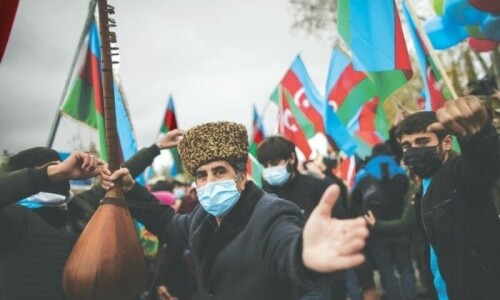AGAINST the backdrop of the days-long sit-in outside President Arif Alvi’s Karachi residence by many relatives of allegedly missing young Shia men, the Sindh police on Monday finally threw some light on the matter. However, aside from perhaps affording the families some relief that their loved ones are still alive, the law-enforcement agency’s words were cold comfort. A senior police official at a press conference in the city claimed that the force had arrested five people, including a reporter from an Urdu-language newspaper, for their alleged involvement in sectarian killings and “anti-state activities”. Among the more startling claims was that some of the individuals had received several days’ training in various aspects of militancy in a “neighbouring country”. The spokesman for the Shia Missing Persons Relatives Committee however, rejected the assertions outright, saying that the men were among 41 belonging to the community — out of a total of 80 across Pakistan — who had been abducted from various parts of Karachi a couple of months ago. He alleged that some had been missing for years.
Whether there is any substance to the police’s claims is yet to be determined, but that is not the point at issue. What can be stated with some certainty is that this bears all the hallmarks of the shameful phenomenon of enforced disappearances from which it seems no corner of the country is safe. The right to due process has clearly been violated here: given that the families have been protesting for several days, it seems rather convenient that the police have suddenly produced such serious allegations against some of the individuals. Nor were the detainees produced in court within 24 hours of their arrest as required by law. To add insult to injury, the senior police official also suggested that some people listed as “missing” may have gone underground to evade capture. It is a story familiar to many a family that knows unequivocally that their loved one was abducted, not arrested; that he or she may be undergoing torture; that they may never see them alive again. Enforced disappearances are universally considered among the most heinous crimes committed by a state against its people. Yet, despite all the condemnation of the execrable practice by the families of the missing and by right-thinking members of society, those guilty of it have never been called to account. The government’s silence on this gross human rights violation is deafening.
Published in Dawn, May 8th, 2019












































